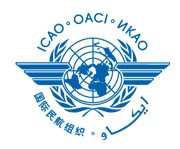Assembly Wrapped Up Its 37th Session Friday
 The 37th Session of the Assembly of
the International Civil Aviation Organization (ICAO) says it
achieved important advancements in aviation safety and aviation
security assuring even greater safety performance in the already
safest and most secure mode of mass transport in the world. The
meeting adopted a comprehensive resolution to reduce the impact of
aviation emissions on climate change. The agreement provides a
roadmap for action through 2050 for the 190 Member States of the
Organization.
The 37th Session of the Assembly of
the International Civil Aviation Organization (ICAO) says it
achieved important advancements in aviation safety and aviation
security assuring even greater safety performance in the already
safest and most secure mode of mass transport in the world. The
meeting adopted a comprehensive resolution to reduce the impact of
aviation emissions on climate change. The agreement provides a
roadmap for action through 2050 for the 190 Member States of the
Organization.
The Organization signed numerous other international agreements,
including cooperation agreements with regional civil aviation
organizations and bodies from all regions of the world.
The resolution on the environment makes ICAO the first United
Nations Agency to lead a sector in the establishment of a globally
harmonized agreement for addressing its CO2 emissions. The
resolution was adopted with some States expressing reservations and
calling upon the ICAO Council to continue its work on specific
aspects of the agreement. The agreement comes only two months
before negotiations are again undertaken by these very same States
at the 16th Conference of the Parties of the United Nations
Framework Convention on Climate Change (UNFCCC) meeting scheduled
for December in Mexico.
“We feel that the Assembly resolution and related
decisions are good examples of the spirit of cooperation that can
make a substantial contribution to the UNFCCC discussions,”
said the President of the ICAO Council, Roberto Kobeh
González.
The agreement builds on achievements since the last ICAO
Assembly in 2007, which included a global goal of 2 per cent annual
fuel efficiency improvement up to the year 2050, a global framework
for the development and deployment of sustainable alternative fuels
for aviation, and a target of 2013 for a CO2 standard for aircraft
engines. Additional new initiatives include the development of a
framework for market-based measures (MBMs), a feasibility study on
the creation of a global MBM scheme and guiding principles for
States to use when designing and implementing market-based measures
for international aviation, all of which will be reviewed at the
next Assembly in 2013.
 “I commend the International Civil Aviation Organization
(ICAO) for adopting today’s Declaration on Aviation Security,
which forges a historic new foundation for aviation security that
will better protect the entire global aviation system from evolving
terrorist threats," said Department of Homeland Security Secretary
Janet Napolitano (pictured) in a statement. "Following the
attempted December 25 terrorist attack, at the President’s
direction, the Department of Homeland Security has worked with ICAO
and our international partners—including representatives from
the private sector ranging from airline CEOs to airport authorities
to aviation industry trade associations—at five regional
aviation security summits on five continents in an unprecedented
effort to strengthen international aviation security. The
extraordinary global collaboration demonstrated by the nearly 190
ICAO countries during the ICAO General Assembly in Montreal has
helped to bring about a truly 21st century international aviation
security framework that will make air travel safer and more secure
than ever before."
“I commend the International Civil Aviation Organization
(ICAO) for adopting today’s Declaration on Aviation Security,
which forges a historic new foundation for aviation security that
will better protect the entire global aviation system from evolving
terrorist threats," said Department of Homeland Security Secretary
Janet Napolitano (pictured) in a statement. "Following the
attempted December 25 terrorist attack, at the President’s
direction, the Department of Homeland Security has worked with ICAO
and our international partners—including representatives from
the private sector ranging from airline CEOs to airport authorities
to aviation industry trade associations—at five regional
aviation security summits on five continents in an unprecedented
effort to strengthen international aviation security. The
extraordinary global collaboration demonstrated by the nearly 190
ICAO countries during the ICAO General Assembly in Montreal has
helped to bring about a truly 21st century international aviation
security framework that will make air travel safer and more secure
than ever before."
Other features of the agreement include:
- Mechanisms for technology transfer to developing States.
- Arequirement for States to submit to ICAO their action plans
for reaching goals set by the Organization.
- Assistance for States to meet their respective objectives.
- Exemptions from market-based measures for States with very low
emissions due to their small traffic base.
“This agreement demonstrates what can be achieved when
parties with divergent and even conflicting views are determined to
progress towards results that are in the best interest of an
industry as critical to the world economy as aviation,” Mr.
Kobeh commented.
Addressing the reality that the majority of accidents and
serious incidents resulting in fatalities occur during the take-off
and landing phases of flights, the Assembly endorsed ICAO’s
plan to establish a multi-disciplinary approach to address the
critical issue of runway safety. This will bring together
representatives from airlines, airports, air navigation service
providers and regulatory authorities. In May 2012, the Organization
will host a Global Runway Safety Symposium in Montréal,
followed by a number of regional workshops to identify and further
resolve runway safety issues.
The Assembly also endorsed a proactive safety strategy based on
the sharing of critical safety information among governments and
industry stakeholders. Greater availability of information in a
transparent process improves the ability to better analyze and
predict safety risks and to take action before issues result in
accidents. Acting proactively on risk indicators can help to
significantly reduce the accidents in all regions of the world.
In a demonstration of support for the strategy, ICAO signed a
Memorandum of Understanding during the Assembly with the United
States Department of Transportation, the European Union, and the
International Air Transport Association for the creation of a
Global Safety Information Exchange. ICAO will coordinate the
collection, analysis and exchange of aviation safety information
among Exchange Members and disseminate to the global aviation
community. The Assembly also endorsed ICAO’s plan intended to
guide the estimated 50 billion dollar investment that States will
make in their aviation infrastructure over the next 10 years.
Through the Global Air Navigation Plan, ICAO acts as global
integrator, facilitating harmonization of a variety of large scale
regional programmes. Initial plans will be introduced to States at
a Global Air Navigation Forum in September of 2011 and finalized in
November of 2012 during the 12th Air Navigation Conference.
An ICAO diplomatic conference held in Beijing, in September
2010, adopted two international air law instruments for the
suppression of unlawful acts relating to civil aviation, to further
criminalize the use of civil aircraft as a weapon and of dangerous
materials to attack aircraft or other targets on the ground. In a
Declaration, unanimously adopted by participants, international
commitment was reaffirmed to enhance aviation security
collaboratively and proactively through screening technologies to
detect prohibited articles, strengthening international standards,
improving security information-sharing and providing
capacity-building assistance to States in need.
The Assembly put its full support behind a comprehensive, new
ICAO aviation security strategy. It highlights key priorities, such
as identifying and preventing new forms of attack before they
occur, streamlining security checks so that they remain effective
but are not duplicated unnecessarily, and improving the
capabilities of States to oversee aviation security.
Just prior to the Assembly, ICAO concluded Memoranda of
Cooperation with two regional organizations – the African
Union and the European Union – and four regional civil
aviation bodies – the Arab Civil Aviation Commission, the
African Civil Aviation Commission, the European Civil Aviation
Conference and the Latin American Civil Aviation Commission. The
objective is to help reduce aircraft accident rates, improve
security in flight and at airports, and promote the overall
sustainable development of the air transport industry.
In the course of the meeting, 49 States enhanced their
relationship with ICAO by working through the Technical Cooperation
Bureau for expanding existing agreements, negotiating new
agreements and identifying agreements for further development.
 ANN's Daily Aero-Linx (04.16.24)
ANN's Daily Aero-Linx (04.16.24) Aero-News: Quote of the Day (04.16.24)
Aero-News: Quote of the Day (04.16.24) Airborne 04.10.24: SnF24!, A50 Heritage Reveal, HeliCycle!, Montaer MC-01
Airborne 04.10.24: SnF24!, A50 Heritage Reveal, HeliCycle!, Montaer MC-01 Airborne 04.12.24: SnF24!, G100UL Is Here, Holy Micro, Plane Tags
Airborne 04.12.24: SnF24!, G100UL Is Here, Holy Micro, Plane Tags Airborne-Flight Training 04.17.24: Feds Need Controllers, Spirit Delay, Redbird
Airborne-Flight Training 04.17.24: Feds Need Controllers, Spirit Delay, Redbird




